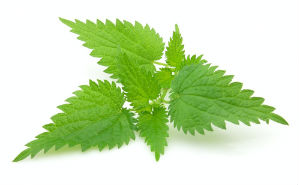Description
Botanical: Urtica dioica
Other common names: Stinging Nettle, Common Nettle, Devil's Leaf, Great Stinging Nettle, Net Plant, Dwarf Nettle
Nettle is a naturally nutritious way to help maintain a healthy urinary tract and flush toxins from your system. It is said to uplift a weary body, reduce fatigue and also improve thyroid, kidney and bladder functions. Nettle is also considered an age-old remedy for allergies and respiratory problems, as well as an old-time women's herb that helps to regulate menses and stimulate lactation in nursing mothers.
Country of Origin: Germany
Beneficial Uses:
Nettle has been used for centuries to nourish and strengthen the urinary tract. Long used as a diuretic, it cleanses the entire system by promoting the flow of urine and also aids kidney and bladder function. The herb is used to expel gravel from the bladder, flush toxins from the system and combat urinary tract infections.
In the specific case of men's health, the herb has been helpful in treating benign prostatic hyperplasia. The fact that Nettle root affects hormones and proteins that carry sex hormones (such as testosterone or estrogen) in the human body may be the reason that Germany's Commission E recommends Nettle Root preparations in the treatment of "Difficulty in urination in benign prostatic hyperplasia stages 1 and 2."
As an anti-inflammatory, Nettle appears to inhibit the manufacture of prostaglandins, which may cause inflammation, and has thus been helpful in easing neuralgia, sprains, tendonitis, sciatica, arthritis, rheumatism and gout. The herb is also thought to purify the blood and neutralize and prevent the crystallization of uric acid, further helping to alleviate inflamed arthritic joints, gout and rheumatism.
As an astringent, Nettle has been effective in stopping external (with topical use) and internal bleeding. It helps to reduce menstrual flow, uterine and internal hemorrhage, blood in the urine, diarrhea and dysentery. The herb's astringency also shrinks inflamed tissues and helps to alleviate hemorrhoids.
With regard to women's health issues, Nettle is believed to be effective against vaginal infections, such as Candida, a yeast infection. In cases where there is excessive menstrual flow, the herb helps to control uterine hemorrhage and also treat anemic conditions that result from excessive blood loss. Moreover, Nettle is supposed to be good for expectant mothers as both a nutritive and by guarding against bleeding, and it is also believed to promote milk production in nursing mothers.
Nettle is said to be a fine circulatory stimulant, opening blood vessels and increasing blood circulation throughout the body. This circulatory action is believed to uplift a weary body and relieve fatigue and exhaustion.
The iodine content in Nettle is said to stimulate and improve thyroid function and is thought to be helpful in treating goiter.
Used externally, modern herbalists use Nettle as a hair tonic and growth stimulant and also an antidandruff shampoo. Nettle tea is also considered an effective hair tonic that may bring back the natural color of the hair. A poultice made of the leaves alleviates pain due to inflammation, and the dried powdered leaf is said to stop nosebleed. As a wash, Nettle is good for burns, eczema, insect bites and wounds. Ironically, although Nettle is a stinging plant, it is sometimes used in cosmetics as a facial.
Nettle tea is an old-fashioned remedy for fever, colds and la grippe, and has often been used to relieve backache.
Contraindications:
Do not take Nettle if you have high blood pressure, and some people may experience mild gastrointestinal upset with the use of this herb. There are concerns that Nettle may interact with prescription medications used for diabetes, high blood pressure, sedation and inflammation; therefore, if taking these medications, please consult your physician before taking the herb. People with fluid retention due to congestive heart failure or kidney disease should not use Nettle, nor should those who think they are coming down with flu, because the herb reduces the body's production of immune chemical interleukin-6. Because of its exceptional diuretic properties, Nettle may cause potassium loss if taken on a regular basis, and supplemental potassium or high potassium foods, such as bananas and fresh vegetables, should be included in the diet.


